

Bicycle Racing News and Opinion,
Friday, September 6, 2024
Back to news and opinion index page for links to archived stories | Commentary | Our YouTube page
2024 Tour de France | 2024 Giro d'Italia
Nothing will work unless you do. - Maya Angelou

Bill McGann’s book Why Your Bike Is Made in Asia: My career in bicycles as I watched two continents squander an industry is available in print & Kindle eBook versions. To get your copy, just click on the Amazon link on the right.
- August 17 - Sept 8: Vuelta a España
- September 3 - 8: Tour of Britain
Upcoming racing:
- September 8: Bemer Cyclassics
September 8: Grand Prix Cycliste de Quebec
Latest completed racing:
- August 28 - September 1: Renewi Tour
- August 25: Bretagne Classic Ouest-France
- August 20 - 23: Tour du Poitou-Charentes en Nouvelle Aquitaine
- August 12 - 18: Tour of Poland
- August 14 - 18: PostNord Denmark Rundt
- August 13 - 16: Tour du Limousin
- August 11: La Polynormande
- August 10: Clasica San Sebastian
- August 5 - 9: Vuelta a Burgos
- August 4 - 7: Arctic Race of Norway
- July 27 - August 4: Olympic cycling
We posted the report from the race organizer with the results.
Here's a machine-translation of the report from stage winner Urku Berrade's Team Kern Pharma:
Few things are celebrated more than a victory that comes from the collective, from the contribution of each and every member of a team. Even more so in a sport like cycling, where success seems to be individual but is always based on the work of the group. This is how the Kern Pharma Team applied itself to achieve its third victory in La Vuelta a España: Urko Berrade raised his arms at the finish line of the 18th stage after an impressive group effort throughout the day.
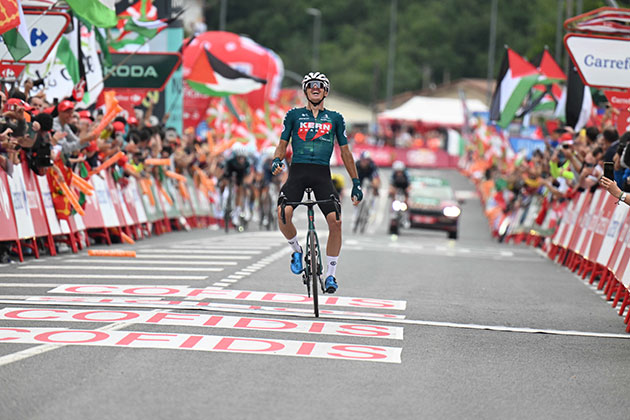
Urku Berrade wins stage 18. Sirotti photo
The breakaway was once again the ideal breeding ground for the success of the Kern Pharma Team. This time, there were up to four cyclists from the Navarrese team who filtered into the large breakaway: Urko Berrade, Pablo Castrillo, Pau Miquel and Unai Iribar, all with experience in these competitions during the last three weeks.
The first two thirds of the stage served to consolidate a comfortable advantage for the breakaway, especially thanks to the great effort of Unai Iribar, sacrificing himself for his teammates before the decisive part. There, 50 kilometres from the finish, the breakaway was selected on the tough climb to Herrera. The Kern Pharma Team, once again, showed its superlative level by introducing its three remaining cyclists into the group of thirteen that would later fight for victory.
The last climbs, already in the Izki Natural Park, were key. An attack by Kruijswijk (TVL) seemed definitive, but Urko Berrade's response was up to par. The Navarrese caught up with him and launched a devastating offensive that quickly left his ephemeral adventure partner behind. Behind, Pau Miquel and Pablo Castrillo acted as ideal squires to protect Berrade and dry up any possible counterattack from the rear.
The final metres, after the agonising effort before, were a catwalk for Urko Berrade, who triumphed alone at the finish line in Maetzu. After him, in absolute jubilation, came Pau Miquel (8th after a decision by the judges) and Pablo Castrillo (9th). The third victory for the Kern Pharma Team in La Vuelta a España is now a fact.
“I saw the moment and I said to myself ‘I’m going to go all out’. And so until the end, my option to win was to arrive alone and that was my chance. This third victory is a dream for the whole team. A joy and a triumph that we have all achieved together, fighting and enjoying these good moments together just as we faced the bad ones before,” said Urko Berrade, victorious at the finish line.
Here's the Vuelta report from second-place Mauro Schmid's Team Jayco AlUla:
Swiss champion Mauro Schmid demonstrated his stunning form once again as he raced to his second second place finish of this year’s Vuelta a España.
The 24-year-old infiltrated the large breakaway group of more than 40 riders on stage 18 following another fierce fight to get up the road, before going on the attack midway through the 179km stage.
Schmid drew two other riders out of the break with him, but the trio were eventually reeled back in by the chasers on the final categorised climb of the day. With the race reset at the front, the Team Jayco AlUla man used his race craft to follow the dangerous counter attacks to find himself in a new break of 12 that formed over the climb.
It was then a game of tactics as the attackers looked at one another as they raced towards the finale. The rider from Switzerland played it smart and bided his time, but nobody could catch Urko Berrade who made a daring solo attack inside the final 6km.
With no cooperation amongst the chasers and with the victory out of his grasp, Schmid sprinted home to another super second place from the chase group, his second runner-up spot of the race and his third top-five finish.
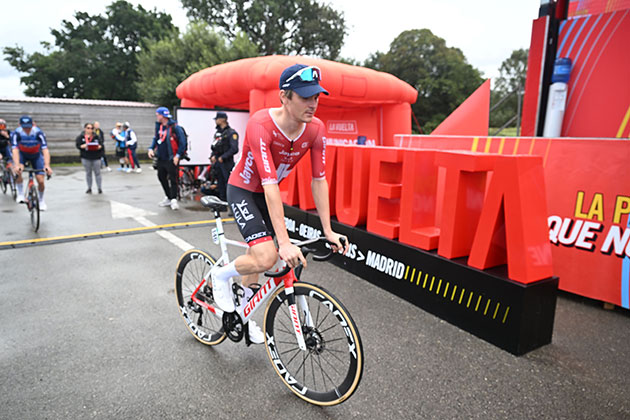
Mauro Schmid before the start of stage 17. Sirotti photo
Mauro Schmid:
“I knew against 40 guys, alone, it would be a difficult task today and then I ended up with Vacek and Kung off the front and we did a good rhythm. I knew if we had a solid gap into the [final] climb it can be good, because the other teams need to sacrifice some guys.
"But in the end, congrats to Kern Pharma, they played it out perfectly in the final and on a climb like this you cannot follow everyone, you need to try to do a good rhythm, but in the end we couldn’t catch him anymore.
"I think today I had great legs. At the end of the second week, I was a bit tired after the two breaks, but in the end we made it two times to the finish, I could race for the win. In the end on the uphill finish I didn’t have the legs, on this stage today I think I had the legs, but the tactics didn’t play out.
"I have a slight possibility tomorrow, but my legs will also hurt tomorrow so I will see if I end up in the break again, otherwise I will try to do a good TT in Madrid again.”
Here's the Vuelta report from 3rd-place Max Poole's Team dsm-firmenich PostNL:
Team dsm-firmenich PostNL’s looked to continue their string of really good results at the Vuelta a España on Thursday, with a stage that looked perfect for another breakaway success. With that in mind for the majority of the peloton, it was an intense start to the stage with attack after attack at the head of the race. Eventually a large group of around 40 managed to go clear, with Pavel Bittner, Chris Hamilton, Tim Naberman and Max Poole all present there for the team.
The gap managed to extend and from over 80 kilometres to go it was obvious that the break would fight it out for the stage come the finish. As a result, it became tactical and a trio attacked from the group. Bittner and Naberman did a great job to keep the pace going in the chasing group as the race charged towards the last categorised climb, where Hamilton helped position Poole before things split up for good. With the trio caught towards the top a group of around 12 riders, including Poole, took on the rolling terrain together. In the finale eventual stage winner Berrade and his teammates were able to play the numerical advantage, with Berrade holding on for the win after a late attack. Poole bided his time and gave it his all in the sprint from the group behind to take a strong fourth place as he crossed the line; after another strong team performance to be active at the front of the bike race.
After the stage the commissaires relegated Miquel Delgado in the sprint, so Poole and the team were promoted to third on the day.
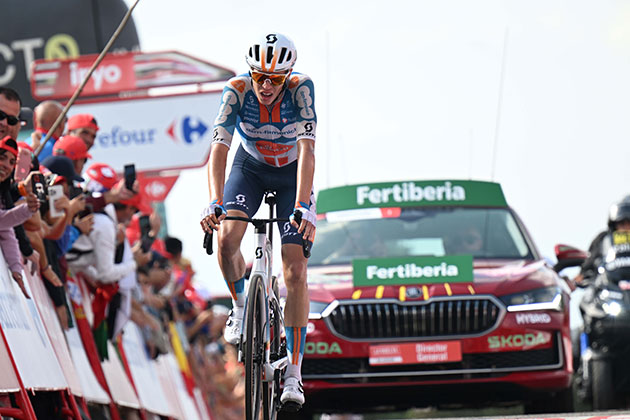
Max Poole finishing stage 12. Sirotti photo
Poole said: “It was another crazy La Vuelta day. It was a really big fight for the break and it went on for a long time. In the end it was great for us to have four guys in the move. Pavel and Tim were super to keep the group going and keep the speed up once the trio had nipped off the front; they were really good today. Me and Hamo were there and when it kicked off on the climb we tried to follow. It became a bit more selective over the top and it was just about trying to save energy for the final. It was nice to be in the race and going for the win again, and of course you always want more, but it was a super hard day. How we rode as a team today was great and then in the final we had to ride a bit on feeling and play the games, but I think we can be satisfied with the third place.”
Team dsm-firmenich PostNL coach Phil West added: “It was another tough day. I think these last stages are getting raced really hard because obviously the opportunities are become fewer as we head towards Madrid. It was a big fight at the start, less selective in some places which made the fight bigger, and in the end we had four guys in the big front group. It was a really nice situation. Pavel and Tim did their roles in a really good way so that Max could be in the selection over the last big climb. It was a little bit about waiting for the right moment or gambling for it in the sprint. With the combination of riders in that final group with some strong rouleurs and climbers, it was tricky. Unfortunately Berrade slipped away but I think we played the right tactic in the end and Max did a really good sprint for third. It’s nice to be in the front of the bike race again.”
Team Soudal Quick-Step posted this Vuelta report:
Thursday afternoon found the peloton in the Basque Country for the 179.5km stage 18 between Vitoria-Gasteiz and Maestu-Parque Natural de Izki. It was a medium-mountain day comprising two classified climbs, the toughest of which was Puerto de Herrera, coming in the last 50 kilometers.
On that steep ascent, some teams decided to put pressure on the red jersey, upping the tempo and splitting the peloton. Mikel Landa found himself distanced but tried his best to limit the losses on his way to the top of the climb, before linking up with the likes of Casper Pedersen, Mauri Vansevenant and Mattia Cattaneo, all of whom had been part of the mammoth breakaway that formed soon after the start.
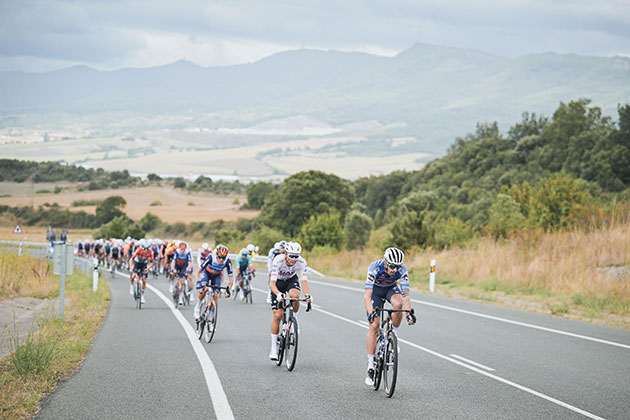
The peloton early in the stage. ASO photo
The T-Rex Quick-Step guys chased hard behind the favourites’ group on this stage won by Urko Berrade (KernPharma), trading pulls at the front and doing their best to keep Mikel in contention for a good result. Thanks to their effort, the Basque remained in the top ten of the general classification ahead of Friday’s stage, which will conclude atop Alto de Moncalvillo, one of the most demanding climbs of this edition.
Here's the Vuelta report from Steven Kruijswijk's Team Visma | Lease a Bike:
Steven Kruijswijk finished tenth in the eighteenth stage of the Vuelta a España. The 37-year-old Dutchman from Team Visma | Lease a Bike attacked in the closing kilometres, but he was countered by later stage winner Urko Berrade. Sepp Kuss lost time on the other GC contenders.
Before the Vuelta peloton enters the final weekend, the 180-kilometre stage between Vitoria-Gasteiz and Maestu was on the programme. The hilly stage in the Basque country had two categorised climbs.
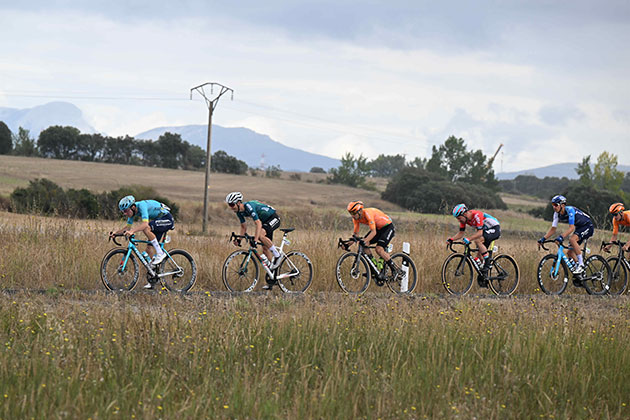
The peloton speeds across Northern Spain. Sirotti photo
Ahead of the first climb of the day, around 40 riders, including Kruijswijk and Attila Valter, formed the early breakaway. The large group created a big gap. On Puerto Herrera, the final climb of the day, the group was firmly thinned out. Thirteen riders, including Kruijswijk, battled for the stage win. In the finale, the Dutchman tried it with an attack. Tactically, it turned out to be the right moment, but he was countered by Berrade. The Spaniard reached the line solo moments later. Kruijswijk finished tenth.
“It was a stage where there were opportunities for the escapees”, Kruijswijk responded afterwards. “Attila and I got in front together with 40 others. Then it was waiting for the crucial final climb. When the race exploded, I was able to follow. In the finale I chose the right moment to attack, but unfortunately I didn't have the legs to continue. It's a pity, but as a team we presented ourselves well.”
“After all the bad luck, it's nice to compete for the win again. It gives enormous satisfaction that I can show myself here. During the rehabilitations, you sometimes start to doubt yourself. It is therefore great to be back in contention for a win at this level. I can be happy with this performance.”
The general classification favourites didn't sit still on the Puerto Herrera either. Kuss could not keep up with the high pace on the climb. The American ended up in a chasing group. Valter - who had dropped out at the front – helped his team leader, but they eventually finished just over three minutes from the group of favourites.
Sports director Grischa Niermann: “When Sepp struggled after the attacks in the peloton, we hoped to limit the damage with Attila's help. Unfortunately, Sepp turned out to have a lesser day. After today, he is still 12th in the general classification, but the gap to tenth place has grown. We will see from day to day what is possible in the final weekend. We can make a lot of plans, but in the end the legs have to be able to execute them.”
Here’s the Vuelta report from Carlos Rodriguez’s Team INEOS Grenadiers:
Carlos Rodriguez moved up to sixth overall after a thrilling stage of La Vuelta a Espana.
The INEOS Grenadiers worked well together to keep Carlos Rodriguez safe in the group of favourites and helped gain time on his near rivals on an undulating Basque country terrain.
Rodriguez retained his lead in the best young rider classification, with three stages remaining of the race.
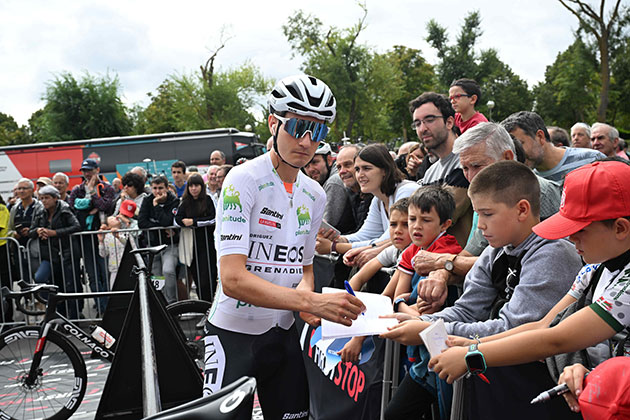
Carlos Rodriguez before the stage start. Sirotti photo
There was a fierce battle to get into the breakaway, with Jhonatan Narvaez and Kim Heiduk eventually making a 42-rider group which only formed after a tough 50 kilometres of racing.
The duo helped the breakaway build a strong advantage over the peloton, with Oscar Rodriguez and Brandon Rivera supporting Carlos Rodriguez in the bunch.
As the race reached the toughest categorised climb of the day, the GC group went clear, with Carlos Rodriguez well-placed. As the category one climb continued, there was a split in the group.
This saw Carlos Rodriguez and the other race leaders gain time over a number of rivals including Mikel Landa (T-Rex-Quick-Step) before descending and maintaining the gap.
Heiduk and Narvaez then came back from the break to help pace the group and extend the advantage which saw Carlos Rodriguez move up to sixth overall with three stages remaining.
Carlos Rodriguez:
"We knew that Herrera was a hard climb and it could be a good day for someone to try, so we were prepared for an attack and it happened in the end.
"I managed to survive and then there were teams interested because Landa was dropped. It was easy to understand each other and collaborate until the finish to have a gap on him.
"Obviously, he’s a big rival and if we can distance him it’s good for us. You never know what can happen. Mikel Landa has been one of the best climbers in this race and today he was dropped on a climb so you never know what can happen in a third week. It has been some really tough stages so we can expect everything.”
Here's the Vuelta report from Team Groupama-FDJ:
For the first day of racing in the Basque Country this Thursday, the Vuelta a España did not just offer a fight within the breakaway, as could be expected. Although Stefan Küng did indeed try it all at the front of the race, before he had to settle for twelfth place, the favorites also had their bit of action on stage 18. David Gaudu didn’t get trapped, and thanks to the support of Quentin Pacher in the final, was able to get into the top-5 overall before the last three decisive stages.
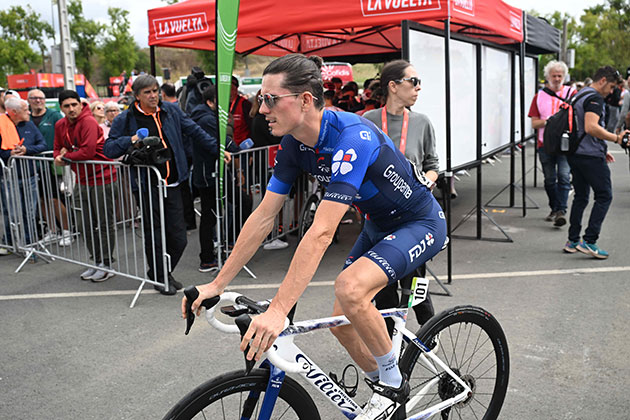
David Gaudu before the start of stage 18. Sirotti photo
Just like the previous days, the candidates for the breakaway were quite numerous this Thursday on stage 18 of the Vuelta, on a winding and hilly route in the Spanish Basque Country. From Vitoria-Gasteix, it therefore took nearly fifty kilometres for a group to shape up at the front. Among the most active at the start, Stefan Küng logically managed to catch the right move, as did some forty other riders. A huge breakaway managed to go clear, although the peloton did not immediately ease off.
At the bottom of the day’s first climb, Quentin Pacher then entered a chasing group, while his Swiss teammate took advantage of the following downhill to go hard at the front. “I was the only member of the team in the breakaway, and some teams had 3-4 riders, so I obviously had to anticipate so as not to get outnumbered later on,” said Stefan. “I did the first downhill at full speed and I went away with two riders. I hoped that the group behind would stop working together. Unfortunately, they still rode quite strong because we never took too much of a gap.”
The time trial specialist did get away with Mauro Schmid and Mathias Vacek, but their lead, which peaked at one minute, was just thirty seconds at the bottom of the main climb of the day, the Puerto de Herrera (5.6 km at 8.3%), located forty-five kilometres from the finish. “The goal for Stefan was to get a small head start before the climb,” said Thierry Bricaud. “It didn’t really work out, because he didn’t have enough of a gap, and they went fast from the bottom behind. These are also hard gradients for him, and he paid for it a little at the end.” Joined by a dozen men at the head of the race, the Swiss rider was a bit distanced as he approached the summit, but he was then able to come back after the descent. Thirteen men eventually got back together to fight for the stage victory, while the battle between the favourites opened up at the back, at the instigation of Richard Carapaz. “It wasn’t the hardest stage on paper, but in the end, there was still some damage on the climb”, commented David, who always stayed very close to his main rivals.
On the other hand, Mikel Landa lost contact, and the Frenchman from Groupama-FDJ quickly climbed into the provisional top-5 overall. “It’s a typical day where you think that not much will happen, but the fatigue at the end of a Grand Tour is there”, explained Thierry. “The proof is that David took advantage of it today, thanks also to the support of Quentin who did a great end to the stage”. Alongside other teams looking to get rid of Landa, the French puncher pulled for his leader until the finish, where the gap exceeded three minutes on the Spaniard. In this same finish, Stefan Küng was not able to fight for the win as he was dropped in the last hill of the course with five kilometres to go.
“I tried again to go before the last climb, unfortunately it didn’t work, but I have no regrets,” he said. “Given the breakaway I was in, it was always going to be difficult. Now, let’s try to recover to get through the next two days in a good way before the time trial.” The Swiss man took twelfth place at the end, while Urko Berrada won solo. “We are frustrated for Stefan because he had a great opportunity today,” added Thierry. “We know that we have everything we need to win a stage, but everything has to come together, and it hasn’t today for Stefan.”
At the end of the eighteenth stage, David Gaudu officially climbed to fifth place overall, 3’48 behind the red jersey Ben O’Connor. “It’s good, but the gaps are small with riders like Skjelmose or Rodriguez”, added David. “It’s tomorrow and the day after that matter and when I’ll need to be strong. We must keep calm. What happened to Landa today can happen to anyone. We stay focused, we’re doing our own race, and we’ll see where we are on Sunday morning before the time trial in Madrid”. “Tomorrow, it will be a fight between the leaders in the final climb before a very hard day on Saturday”, Thierry concluded. “The Vuelta is far from over”.
Back to news and opinion index page for links to archived stories | Commentary







